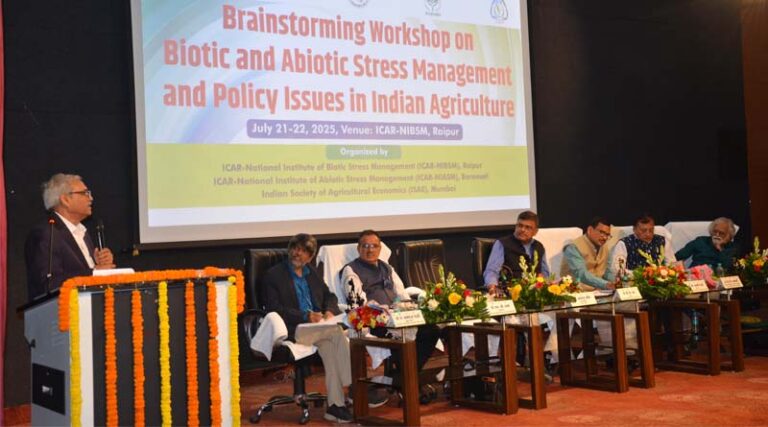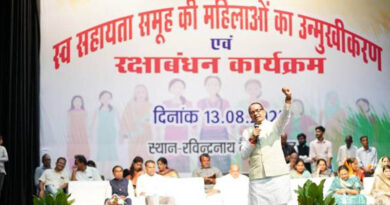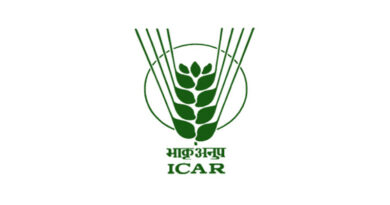
ICAR-NIBSM Hosts National Brainstorming Session on Biotic and Abiotic Stress Management in Indian Agriculture
23 July 2025, New Delhi: The ICAR-National Institute of Biotic Stress Management (ICAR-NIBSM), Raipur, in collaboration with ICAR-National Institute of Abiotic Stress Management (ICAR-NIASM), Baramati, and the Indian Society of Agricultural Economics (ISAE), Mumbai, successfully conducted a two-day national brainstorming session titled “Biotic and Abiotic Stress Management and Policies in Indian Agriculture” on July 21–22, 2025. The event was partially supported by NABARD, Raipur. Bringing together approximately 70 participants, including prominent scientists, agricultural economists, and policymakers from across the country, the session aimed to chart a science-driven policy roadmap to address the growing threats posed by biotic and abiotic stresses in Indian agriculture.
Focus of the Consultation
The national consultation was designed to deliberate on both scientific advancements and institutional strategies that could strengthen India’s resilience to agricultural stresses. Biotic stresses such as pests, diseases, and invasive species, and abiotic stresses including drought, salinity, floods, and extreme heat, pose significant challenges to crop productivity and farmer livelihoods. The brainstorming session aimed to identify innovative approaches, collaborative frameworks, and practical policy recommendations to address these multifaceted challenges through a unified national agenda.
Inaugural Session and Key Dignitaries
The event was inaugurated by a panel of distinguished experts and institutional leaders. Dr. H. C. Sharma, Former Vice Chancellor of Himachal Pradesh Krishi Vishvavidyalaya, Palampur, addressed scientific innovations needed for biotic stress control. Dr. P. K. Chakrabarty, Former ADG (Plant Protection & Biosecurity) and current Member of the Agricultural Scientists Recruitment Board, highlighted the critical role of regulatory frameworks and policy support. Dr. P. K. Rai, Director of ICAR-NIBSM, and Dr. K. Sammi Reddy, Director of ICAR-NIASM, spoke about the collaborative efforts between the two institutes to address stress management in an integrated manner. Dr. D. K. Marothia, President of the Indian Society of Agricultural Economics, and Mr. Gyanendra Mani, Chief General Manager of NABARD, shared insights on economic and institutional considerations. Dr. A. Amarender Reddy, Joint Director, School of Climate and Human-Plant System Resilience (SCHPSR), ICAR-NIBSM, also addressed the audience during the inaugural.
Adding to the policy dialogue, two key publications on biotic and abiotic stress management were released during the inaugural session. These publications aim to inform researchers, development agencies, and policymakers about the latest scientific developments and implementation strategies.
Technical Deliberations and Emerging Priorities
The technical sessions spanned a wide range of themes and brought forward substantial insights. The session on scientific and regulatory innovations in biotic stress management, led by Dr. H. C. Sharma, explored the role of genetics, integrated pest management, and surveillance systems in mitigating pest and disease outbreaks. Dr. P. K. Chakrabarty, during the session on policy and institutional strategies for biotic stress, emphasized the importance of aligning national regulations with global best practices while enhancing the capabilities of domestic institutions.
Technological solutions to abiotic stress were the focus of the session led by Dr. Anjani Kumar from the International Food Policy Research Institute (IFPRI). He underlined the role of precision farming, resilient crop varieties, and water-saving technologies in adapting to changing climate patterns. Dr. K. L. Gurjar from the Directorate of Plant Protection, Quarantine and Storage (DPPQS), presented a framework for improving abiotic stress resilience through public-private partnerships, targeted investments, and policy coherence.
The discussions across sessions identified several key priorities. These included the need for early warning systems, scaling up adoption of climate-resilient technologies, improved coordination between scientific and regulatory bodies, capacity-building of stakeholders, and the formulation of integrated policy instruments that address both economic and environmental concerns.
Path Ahead and Policy Paper Development
The outcomes of the brainstorming session will serve as the foundation for a policy paper currently under preparation. This document will provide strategic guidance for future national-level programs, research agendas, and investments in stress management. The paper aims to bridge science, policy, and field-level implementation, and will be shared with relevant government agencies, research bodies, and development organizations to foster collaborative action.
Conclusion and Acknowledgements
The event concluded with final remarks and a vote of thanks delivered by Dr. K. Srinivas. He acknowledged the contributions of all delegates, resource persons, partner institutions, and NABARD for their support. ICAR-NIBSM expressed its heartfelt appreciation to ICAR-NIASM, ISAE, NABARD, and all participants for their active involvement and commitment to building a more resilient and sustainable agricultural sector in India.
Also Read: Verdesian Life Sciences Appoints RK Goyal as Head of Asia Commercial Operations
📢 If You’re in Agriculture, Make Sure the Right People Hear Your Story.
From product launches to strategic announcements, Global Agriculture offers unmatched visibility across international agri-business markets. Connect with us at pr@global-agriculture.com to explore editorial and advertising opportunities that reach the right audience, worldwide.






